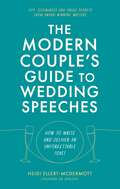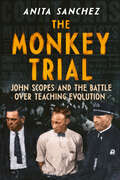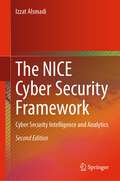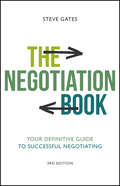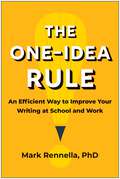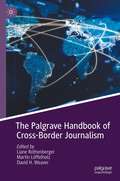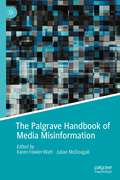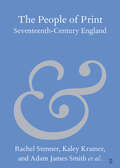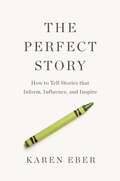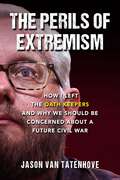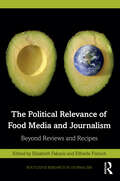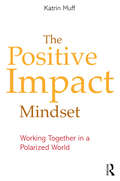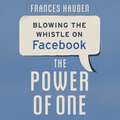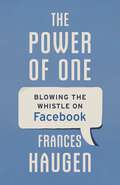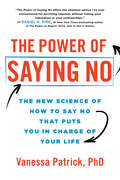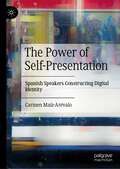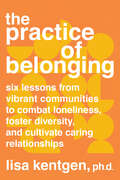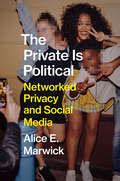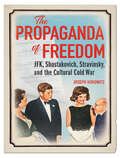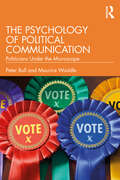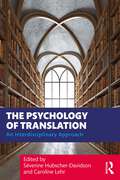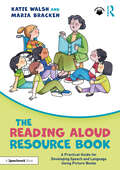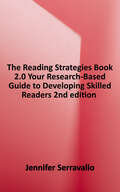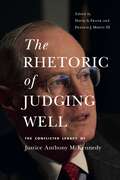- Table View
- List View
The Modern Couple's Guide to Wedding Speeches: How to Write and Deliver an Unforgettable Speech or Toast
by Heidi Ellert-McDermottGroom or bride, straight or gay. Nail the perfect words to say.There's no longer an excuse for wedding speeches to be a tedious succession of predictable platitudes, outdated etiquette and cheesy wedding gags. This book is for nearlyweds who want to make their wedding speeches one of the day's highlights.Written by Heidi Ellert-McDermott, award-winning wedding speechwriter and founder of Speechy, this guide will help you write and deliver a speech that's memorable for the right reasons.Heidi's advice has been quoted everywhere from the Daily Mail to the New York Times, and with insights and trade secrets from comedians, TV scriptwriters and wedding influencers, this is the ultimate toolkit for couples wanting to make their wedding speeches a little more wonderful.Create a lifelong memory as you: · Plan the perfect speech line up· Decide how to represent your union 'on mic'· Swot up on modern speech etiquette· Gather cracking content and curate your best material· Discover the simple speechwriter techniques that will help you develop unique, humorous and sentimental lines to add wit and depth to your speech· Learn the trade secrets to delivering like a pro · Get inspired by over a dozen wedding speech examples written by professional speechwriters
The Modern Couple's Guide to Wedding Speeches: How to Write and Deliver an Unforgettable Speech or Toast
by Heidi Ellert-McDermottGroom or bride, straight or gay. Nail the perfect words to say.There's no longer an excuse for wedding speeches to be a tedious succession of predictable platitudes, outdated etiquette and cheesy wedding gags. This book is for nearlyweds who want to make their wedding speeches one of the day's highlights.Written by Heidi Ellert-McDermott, award-winning wedding speechwriter and founder of Speechy, this guide will help you write and deliver a speech that's memorable for the right reasons.Heidi's advice has been quoted everywhere from the Daily Mail to the New York Times, and with insights and trade secrets from comedians, TV scriptwriters and wedding influencers, this is the ultimate toolkit for couples wanting to make their wedding speeches a little more wonderful.Create a lifelong memory as you: · Plan the perfect speech line up· Decide how to represent your union 'on mic'· Swot up on modern speech etiquette· Gather cracking content and curate your best material· Discover the simple speechwriter techniques that will help you develop unique, humorous and sentimental lines to add wit and depth to your speech· Learn the trade secrets to delivering like a pro · Get inspired by over a dozen wedding speech examples written by professional speechwriters
The Monkey Trial: John Scopes and the Battle over Teaching Evolution
by Anita SanchezRevealing little-known facts about the fight to teach evolution in schools, this riveting account of the dramatic 1925 Scopes Trial (aka “the Monkey Trial”) speaks directly to today’s fights over what students learn, the tension between science and religion, the influence of the media on public debate, and the power of one individual to change history. Arrested? For teaching? John Scopes’s crime riveted the world, and crowds flocked to the trial of the man who dared to tell students about a forbidden topic—evolution.The year was 1925, and discussing Darwin’s theory of evolution was illegal in Tennessee classrooms. Lawyers wanted to challenge the law, and businessmen smelled opportunity. But no one imagined the firestorm the Scopes Trial would ignite—or the media circus that would follow.As reporters, souvenir-hawking vendors, angry protestors, and even real monkeys mobbed the courthouse, a breathless public followed the action live on national radio broadcasts. All were fascinated by the bitter duel between science and religion, an argument that boiled down to the question of who controls what students can learn—an issue that resonates to this day.Through contemporary visuals and evocative prose, Anita Sanchez vividly captures the passion, personalities, and pageantry of the infamous “Monkey Trial,” highlighting the quiet dignity of the teacher who stood up for his students’ right to learn.
The NICE Cyber Security Framework: Cyber Security Intelligence and Analytics
by Izzat AlsmadiThis updated textbook is for courses in cyber security education that follow the National Initiative for Cybersecurity Education (NICE) framework which adopts the Competency- Based Education (CBE) method. The book creates content based on the Knowledge, Skills and Abilities (a.k.a. KSAs) described in the NICE framework. This book focuses on cyber analytics and intelligence areas. The book has 18 chapters: Introduction, Acquisition Management, Continuity Planning and Disaster Recovery, Cyber Defense Analysis and Support, Cyber Intelligence, Cyber Intelligence Analysis, Cyber Operational Planning, Cyber Policy and Strategy Management, Cyber Threat Analysis, Cybersecurity Management, Forensics Analysis, Identity Management, Incident Response, Collection Operations, Computer Network Defense, Data Analysis, Threat Analysis and last chapter, Vulnerability Assessment.
The Negotiation Book: Your Definitive Guide to Successful Negotiating
by Steve GatesBecome the best negotiator you can be, one manageable step at a time In the newly updated third edition of The Negotiation Book: Your Definitive Guide to Successful Negotiating, distinguished commercial negotiator Steve Gates delivers a singular and practical guide to the art and science of negotiation. Steve Gates is the founder of the world’s leading negotiation consultancy, The Gap Partnership – and the methodology in this book is used by the world’s biggest businesses to successfully execute their strategies. The book lays out the behaviours and traits associated with successful negotiation and offers a comprehensive model for how power, process and behaviour can have substantial impacts on your next negotiation. You’ll also learn how you can shape these factors to optimise value for yourself, your client or your organisation. The author shows you how to secure more agreements and realise more value with every agreement you conclude. Through simple, realistic and hands-on advice, you’ll improve as a negotiator and apply straightforward techniques to the real-world, dynamic environments in which your negotiations take place. You’ll also find: Strategies for maintaining a balanced perspective and keeping your ego in check Maintaining a focus on the interests and priorities of the other party/parties Incremental steps for improving your negotiation ability that are easy to apply and retain This third edition brings the book firmly into the zeitgeist as it considers the very modern challenges presented to commercial negotiators as a result of an ever-changing world, in which they must navigate technological advancements, the post-Covid reality of virtual negotiation, and the impact of war, Brexit and other macro-economic and political developments that are having far-reaching impacts to business and beyond. An invaluable roadmap to becoming a Complete Skilled Negotiator, The Negotiation Book is the negotiation playbook that business leaders, lawyers, consultants and other professionals have been waiting for.
The One-Idea Rule: An Efficient Way to Improve Your Writing at School and Work
by Mark RennellaFocused on a simple principle and designed to bolster writers&’ confidence and skills, writing coach at Harvard Business School Mark Rennella offers practical advice for students and budding writers—with the goal of leveling the playing field between beginners and those with more experience. After a 30-year career as a writer, instructor, and editor, Mark Rennella has crafted a battle-tested method to help students and young professionals who want to improve their writing: the One-Idea Rule, anchored on the assertion that every component of a successful piece of writing should express only one idea. With The One-Idea Rule, writers embarking on their adult lives and professional journeys will have a reliable methodology they can easily remember and count on for all of their writing tasks, as well as increased confidence about the cogency of their writing and its potential for impact in the public sphere. Most advice about writing looks like a long laundry list of dos and don&’ts. For those already accomplished as writers, these lists can be a helpful addition to an already-developed communication style. But for teens starting college and young professionals entering the workforce, it can be challenging to wield such complex advice to tackle increasingly demanding writing assignments. The One-Idea Rule is a writing primer aligned and empathetic with any young writer's needs.
The Palgrave Handbook of Cross-Border Journalism
by David H. Weaver Martin Löffelholz Liane RothenbergerThis handbook critically analyzes cross‐border news production and “transnational journalism cultures” in the evolving field of cross-border journalism. As the era of the internet hasfurther expanded the border‐transcending production, dissemination andreception of news, and with transnational co‐operations like the European Broadcasting Union and BBC World News demonstrating different kinds of cross‐border journalism, the handbook considers the field with a range of international contributions. It explores cross-border journalism from conceptual and empirical angles and includes perspectives on the the systemic contexts of cross‐border journalism, its structures and routines, changes in production processes, and the shifting roles of actors in digital environments. It examines cross-border journalism across regions and concludes with discussions on the future of cross-border journalism, including the influence of automation, algorithmisation, virtual reality and AI.
The Palgrave Handbook of Media Misinformation
by Julian McDougall Karen Fowler-WattThe Palgrave Handbook of Media Misinformation provides a comprehensive and cutting-edge resource on the critical debates surrounding fake news and misinformation online. Spanning all continents and linking academic, journalistic, and educational communities, this collection offers authoritative coverage of conspiracy theories, the post-Trump and Brexit landscape, and the role of big tech in threats to democracy and free speech. The collection moves through a diagnosis of misinformation and its impacts on democracy and civic societies, the 'mainstreaming' of conspiracy theory, the impacts of misinformation on health and science, and the increasing significance of data visualization. Following these diagnoses, the handbook moves to responses from two communities of practice – the world of journalism and the field of media literacy.
The People of Print: Seventeenth-Century England (Elements in Publishing and Book Culture)
by Jennifer Young Joe Saunders Rachel Stenner Michael Durrant Kaley Kramer Adam James Smith William Clayton Georgina E. Wilson Alan B. Farmer Benjamin Woodring Verônica Calsoni Lima Rosalind JohnsonThis collection profiles understudied figures in the book and print trades of the seventeenth century. With an equal balance between women and men, it intervenes in the history of the trades, emphasising the broad range of material, cultural, and ideological work these people undertook. It offers a biographical introduction to each figure, placing them in their social, professional, and institutional settings. The collection considers varied print trade roles including that of the printer, publisher, paper-maker, and bookseller, as well as several specific trade networks and numerous textual forms. The biographies draw on extensive new archival research, with details of key sources for further study on each figure. Chronologically organised, this Element offers a primer both on numerous individual figures, and on the tribulations and innovations of the print trade in the century of revolution.
The Perfect Story: How to Tell Stories that Inform, Influence, and Inspire
by Karen Eber"Come for the engrossing content, and stay for the lessons that might just change how you talk, write, and lead.&” —Adam GrantLearn how to take any story and make it perfect—from storytelling expert Karen Eber, whose popular TED Talk on the subject continues to be a source of inspiration for millions.What makes a story perfect? How do you tell the perfect story for any occasion?We live in a story world. Stories are a memorable and engaging way to differentiate yourself, build connection and trust, create new thinking, bring meaning to data, and even influence decision-making. But how do you turn a good story into a great story that informs, influences, and inspires?In The Perfect Story, Karen Eber—leadership consultant, professional keynote storyteller, and TED speaker—shares the science of storytelling to teach you to:Leverage the Five Factory Settings of the Brain to hack the art of storytellingBuild a toolkit of endless story ideasDefine the audience for your storyApply a memorable story structureEngage senses and emotionsTell stories with dataAvoid common storytelling mistakesUse your body to tell dynamic storiesEnsure your story doesn't manipulateNavigate and embrace the vulnerability of storytellingWithout relying on complicated models or one-size-fits-all prescriptions, this book makes storytelling accessible with practical and impactful steps for anyone to tell the perfect story for any occasion.Through interview vignettes, The Perfect Story also shares approaches from different storytellers, including the Sundance Institute cofounder, an executive producer of The Moth, the former creative director at Pixar, the TED Radio Hour podcast host, and many more.Whether you are leading a team, giving a presentation, hosting a podcast, selling a product or service, interviewing for a job, or giving a toast at a wedding, The Perfect Story will help you take your stories and make them perfect.
The Perils of Extremism: How I Left the Oath Keepers and Why We Should be Concerned about a Future Civil War
by Jason Van TatenhoveAn explosive behind the scenes look at the Oath Keepers: what makes them tick, who they are, and what they REALLY stand for. The Oath Keepers first made a name for themselves with the infamous Bundy Ranch standoff in 2014. They have continued through to the US Capitol insurrection in early 2021. The Oath Keepers—including many former military members—have become one of the largest anti-government extremist groups in the United States, labeled one of the most dangerous domestic terror threats by the FBI. There have been countless articles and a few books written about the group, but nothing like this. Author Jason Van Tatenhove knows them from the inside. The Perils of Extremism is a first-hand account of the aging punk-rock journalist from Colorado as he was embedded with Stewart Rhodes and that most infamous militia, the Oath Keepers, as well as details from his time testifying to the United States House Select Committee on the January 6 Attack both in person live on TV on July 12, 2022 and during three and a half hours of taped deposition in March 2022. Jason takes the readers along on a journey that started with the Bundy Ranch Stand-off and continued with two more armed standoffs in Oregon and Montana. Jason was then offered a job as the national media director and associate editor for the Oath Keepers. He moved his family up to the Eureka, Montana area to start his job, where he found himself in a "who&’s who" of right-wing extremism. Jason even struck up a friendship with Stewart Rhodes when Stewart lived in Jason&’s basement for several months. Stewart confided in him about his actual beliefs and about how much of what he says publicly is to sell more memberships. Jason ultimately broke ties with the ever-radicalizing anti-government militia group when they begin to embrace the ideology of American Nazis and began associating with the spokesperson for the Alt-Right, Richard Spencer. From there, Jason began speaking out against the dangers of the extremist militia and tried to make amends in his life for being a part of something that led in part to the January 6 insurrection. Readers will also journey with Jason as he begins to be featured in documentaries, feature articles, and national news coverage as he speaks out against violent extremism. As mentioned, this book will also include his experiences testifying to congressional investigators.
The Political Relevance of Food Media and Journalism: Beyond Reviews and Recipes (Routledge Research in Journalism)
by Elfriede Fürsich Elizabeth FakazisInterrogating the intersections of food, journalism, and politics, this book offers a critical examination of food media and journalism, and its political potential against the backdrop of contemporary social challenges. Contributors analyze current and historic examples such as #BlackLivesMatter, COVID-19, climate change, Brexit, food sovereignty, and identity politics, highlighting how food media and journalism reach beyond the commercial imperatives of lifestyle journalism to negotiate nationalism, globalization, and social inequalities. The volume challenges the idea that food media/journalism are trivial and apolitical by drawing attention to the complex ways that storytelling about food has engaged political discourses in the past, and the innovative ways it is doing so today. Bringing together international scholars from a variety of disciplines, the book will be of great interest to scholars and students of journalism, communication, media studies, food studies, sociology, and anthropology.
The Positive Impact Mindset: Working Together in a Polarized World
by Katrin MuffWe are facing a new and urgent challenge when collaborating across organizations, and with broader stakeholder groups: how to overcome polarization. It has never been harder to find a common vision, when opinions are often considered as facts. This book empowers changemakers and business leaders to understand how successful organizations in the 21st century require leaders to become fluent in collaborating outside of traditional business boundaries. Such collaboration often involves working with parties that hold very different values, opinions and priorities, and working with them requires new skills. Building on the book Five Superpowers for Co-Creators, Katrin Muff presents a number of real-world examples that demonstrate how organizations have successfully managed to address these challenges. Examples of such unlikely but successful cross-sector collaboration include a project addressing plastic waste in Switzerland, and two European city government projects that reached out beyond organizational boundaries. The book features many stories of trial and error in overcoming the societal polarization gap. From all these insights emerges clear guidance as to how leaders and organizations can transform to new ‘outside-in’ mindsets to overcome polarization and develop a Positive Impact Mindset. The book is ideal for use by facilitators, educators, business and political leaders, and consultants, who are seeking solutions within an often polarized world to achieve sustainable change and a positive impact.
The Power of One: Blowing the Whistle on Facebook
by Frances HaugenWhistleblower Frances Haugen's exposé of the internal workings of Facebook revealing the company's struggles to regain control over its platform and to stop the spread of misinformationIn the spring of 2021, when news outlets feasted on "the Facebook Files," Frances Haugen went public as the former employee who blew the whistle on the company by copying tens of thousands of documents. She testified to Congress and spoke to the media. She was hailed at President Biden's first State of the Union Address. She made sure everyone understood exactly what the documents revealed: Facebook not only set its algorithm to reward extremism, it knew that its customers were using the platform to foment violence, to spread falsehoods, to diminish the self-esteem of young people, and more. But how was it that Frances was the only employee at the company who dared to step forward?The answer to that question is an inspiring tale of one young woman's life. She grew up in an unhappy home and threw herself into schoolwork and her high school debate team. She made the unusual decision to join the founding class of a new engineering school in Massachusetts, even though it wasn't yet accredited. Prior to attending Harvard Business School, she out-hustled a raft of candidates to win a coveted job at Google as a product manager in a department that was 88% male-and a huge challenge for a woman to survive. In business school, she again didn't fit in. But at each step of the way, including at Pinterest and Yelp, she focused on what mattered, and ignored her critics. She learned the hard way that you can't please everyone, and you have to fight the battles that matter.The Power of One is equally inspiring-the story of a woman who went against the grain, again and again, and changed the world-and horrifying, as the culture and practices of Facebook are brought to the bright light of day, for the first time.(P)2023 Hachette Audio
The Power of One: Blowing the Whistle on Facebook
by Frances Haugen**Available for pre-order: Whistleblower Frances Haugen's searing exposé of the internal workings of Facebook revealing the company's struggles to regain control over its platform and to stop the spread of misinformation**__________In the spring of 2021, when news outlets feasted on "the Facebook Files," Frances Haugen went public as the former employee who blew the whistle on the company by copying tens of thousands of documents. She testified to Congress and spoke to the media. She was hailed at President Biden's first State of the Union Address. She made sure everyone understood exactly what the documents revealed: Facebook not only set its algorithm to reward extremism, it knew that its customers were using the platform to foment violence, to spread falsehoods, to diminish the self-esteem of young people, and more. But how was it that Frances was the only employee at the company who dared to step forward?The answer to that question is an inspiring tale of one young woman's life and the choices she made. From an isolated childhood in Iowa to an unaccredited college, to one among the few women at Google in its heyday, Frances Haugen learned how to focus on what mattered, and to ignore her critics. To harness the strength of standing in the truth.The Power of One is equally inspiring - the story of a woman who went against the grain, again and again, and changed the world - and horrifying, as the culture and practices of Facebook are brought into the bright light of day, for the first time.__________
The Power of Saying No: The New Science of How to Say No that Puts You in Charge of Your Life
by Vanessa Patrick PhD"If you're tired of agreeing to annoying asks and thankless tasks, read this book. The Power of Saying No offers the smartest advice I've ever encountered for declining requests without risking your reputation or your relationships. This essential guide will sharpen your mind and steel your spine to live life on your own terms." —Daniel H. Pink, #1 New York Times bestselling author of The Power of Regret, Drive, and To Sell Is HumanStop saying yes. Start saying no. Change your life!You have probably said "yes" to bosses, partners, family, friends, and even strangers, when you actually want to say "no." Maybe you wish you could say no more often, but you're not sure how or if it's even possible to do so. You're not alone! We're taught to say yes as often as we can. After all, if you say no, aren't you likely to miss out on opportunities and sever important relationships? Isn't saying no a harmony-buster?In The Power of Saying No, award-winning professor and researcher Vanessa Patrick delves into the new science of saying no. She introduces the ground-breaking concept of "empowered refusal"—a proven framework for saying no that puts you in charge of your life—and reveals some surprising secrets about the power of the word no.Dr. Patrick shares:Why empowered refusal is a valuable superskill that helps us say no in a way that does not invite pushback from others.The toolkit of three competencies you need to develop to effectively communicate an empowered no response.A framework to help separate the "good-for-me" from the "not-good-for-me" activities and engagements that come our way.How to establish and implement personal policies that empower your refusal.How to use empowered refusal to manage difficult askers, strengthen your relationships and realize your full potential.It's more important than ever to protect your time, focus on your top priorities, and use the power of saying no to reach your goals at work and at home. Empowered refusal is a unique, positive, and meaning-filled approach to managing your energy and ambition effectively, allowing you to make lasting, positive changes in your life.This empowering book is a fascinating read that will help you with conflict resolution, boundaries, communication, and difficult conversations!"The Power of Saying No will stay within arm's reach for me. It offers the explanations and the inspirations I need to take charge of my life and career, with concrete tools to make it happen. I was able to put Vanessa Patrick's lessons to work the day I started reading the book and have continued every day since. Read this book. Twice." —Dolly Chugh, author of The Person You Mean to Be and A More Just Future, Jacob B. Melnick Term Professor at the NYU Stern School of Business
The Power of Self-Presentation: Spanish Speakers Constructing Digital Identity
by Carmen Maíz-ArévaloThis book follows a Goffmanian approach to self-presentation to focus on the different strategies Spanish users employ to construct their digital identity in profiles, biographies, pictures, and statuses on platforms such WhatsApp, Twitter, Facebook, Instagram and LinkedIn. The author presents a functioning taxonomy of self-presentation strategies along the front-stage/back-stage continuum, including common strategies such as eudaimonic (or inspirational) messages and the use of humour. Special attention is paid to the effects of social variables such as the users' gender and age, and the perceived purposes of the different platforms (e.g. LinkedIn is often intended as a professional market for job hunting, whereas Facebook is rarely used in this context). The book will be of interest to students and scholars of Technologically Mediated Communication (traditionally known as Computer-Mediated Communication or CMC), media communication, internet pragmatics, digital discourse analysis, and related fields.
The Practice of Belonging: Six Lessons from Vibrant Communities to Combat Loneliness, Foster Diversity, and Cultivate Caring Relationships
by Lisa KentgenAn inspirational guide to the 6 core qualities of healthy communities, for anyone looking to build community as a source of connection and a vehicle for social changeAfter two years meeting with different communities in the US, psychologist Lisa Kentgen identified 6 key traits of vibrant, healthy communities that we can all apply to our own lives and networks:Commitment to careAcceptanceDiversitySkillful conflict resolutionBonding ritualsHospitalityEach chapter focuses on one of these traits, highlighting a particular community as a case study of how it can be put into practice. You&’ll learn about a wide range of successful community models, including a tiny-home village for people who had been chronically houseless in Austin, Texas; a study circle to build connection between Native and non-Native people in a small town in South Dakota; a 500-member community choir in Columbus, Ohio; and a Buddhist center in Barre, Massachusetts committed to bringing greater diversity to the Dharma.Throughout the book, you&’ll reflect: How can we cultivate these traits of vibrant community in our own lives? What would it look like to prioritize caring and acceptance in our interactions with others? How can we create a climate of true inclusivity, one where our differences both challenge and strengthen us? How can we learn to feel more comfortable with tension and acquire the skills to move through conflict toward creative solutions? What would happen if we incorporated meaningful rituals into our communities and made a point of celebrating each other? With intention and practice, we can transform our social relationships and build communities that appreciate difference, encourage authentic expression, and foster an environment of belonging and mutual care. This book will inspire you to make the transformative leap from &“me&” to &“we,&” creating communal, loving spaces in which to connect--and thrive--together.
The Private Is Political: Networked Privacy and Social Media
by Alice E. MarwickA compelling firsthand investigation of how social media and big data have amplified the close relationship between privacy and inequality Online privacy is under constant attack by social media and big data technologies. But we cannot rely on individual actions to remedy this—it is a matter of social justice. Alice E. Marwick offers a new way of understanding how privacy is jeopardized, particularly for marginalized and disadvantaged communities—including immigrants, the poor, people of color, LGBTQ+ populations, and victims of online harassment. Marwick shows that few resources or regulations for preventing personal information from spreading on the internet. Through a new theory of “networked privacy,” she reveals how current legal and technological frameworks are woefully inadequate in addressing issues of privacy—often by design. Drawing from interviews and focus groups encompassing a diverse group of Americans, Marwick shows that even heavy social media users care deeply about privacy and engage in extensive “privacy work” to protect it. But people are up against the violation machine of the modern internet. Safeguarding privacy must happen at the collective level.
The Propaganda of Freedom: JFK, Shostakovich, Stravinsky, and the Cultural Cold War (Music in American Life)
by Joseph HorowitzThe perils of equating notions of freedom with artistic vitality Eloquently extolled by President John F. Kennedy, the idea that only artists in free societies can produce great art became a bedrock assumption of the Cold War. That this conviction defied centuries of historical evidence--to say nothing of achievements within the Soviet Union--failed to impact impregnable cultural Cold War doctrine. Joseph Horowitz writes: “That so many fine minds could have cheapened freedom by over-praising it, turning it into a reductionist propaganda mantra, is one measure of the intellectual cost of the Cold War.” He shows how the efforts of the CIA-funded Congress for Cultural Freedom were distorted by an anti-totalitarian “psychology of exile” traceable to its secretary general, the displaced Russian aristocrat/composer Nicolas Nabokov, and to Nabokov’s hero Igor Stravinsky. In counterpoint, Horowitz investigates personal, social, and political factors that actually shape the creative act. He here focuses on Stravinsky, who in Los Angeles experienced a “freedom not to matter,” and Dmitri Shostakovich, who was both victim and beneficiary of Soviet cultural policies. He also takes a fresh look at cultural exchange and explores paradoxical similarities and differences framing the popularization of classical music in the Soviet Union and the United States. In closing, he assesses the Kennedy administration’s arts advocacy initiatives and their pertinence to today’s fraught American national identity. Challenging long-entrenched myths, The Propaganda of Freedom newly explores the tangled relationship between the ideology of freedom and ideals of cultural achievement.
The Psychology of Political Communication: Politicians Under the Microscope
by Peter Bull Maurice WaddleContemporary politics is mass-communication politics. Politicians are not only seen and heard, they are seen and heard in close-up through television appearances, speeches, interviews, and on social media. In this book, the authors analyse the ways in which politicians communicate with each other, the media, and the electorate; they also discuss the implications of contemporary political discourse on the democratic process as a whole. Politicians in interviews are typically castigated for their evasiveness. However, microanalytic research shows that there is more to political discourse than this apparent ambiguity. This book reveals how equivocation, interruptions, and personal antagonism can offer valuable insights into a politician’s communicative style. The authors review their empirical research not only on political interviews, but also on speeches, parliamentary debates, and political journalism. Further insights include how political speakers interact with their audiences, how party leaders engage in adversarial discourse at PMQs, and how the spoken messages of politicians can be affected by modern journalistic editing techniques. Thereby, this research generates greater awareness of communicative practices in a diverse range of political contexts. While the interviews and parliamentary debates analysed pertain to UK politics, the speeches also draw on the USA, and European and Far Eastern nations. This engaging book is a fascinating resource for students and academics in psychology, politics, communication, and other related disciplines such as sociology and linguistics. The research is also extremely relevant to policy makers and practitioners in politics and political journalism.
The Psychology of Translation: An Interdisciplinary Approach
by Séverine Hubscher-Davidson Caroline LehrDrawing on work from scholars in both psychology and translation studies, this collection offers new perspectives on what Holmes (1972) called ‘translation psychology’. This interdisciplinary volume brings together contributions addressing translation from the vantage point of different applied branches of psychology, including critical-developmental psychology, occupational psychology, and forensic psychology. Current theoretical and methodological practices in these areas have the potential to strengthen and diversify how translators’ decision-making and problem-solving behaviours are understood, but many sub-branches of psychology have lacked visibility so far in the translation studies literature. The Psychology of Translation: An Interdisciplinary Approach therefore seeks to expand our understanding of translator behaviour by bringing to the fore new schools of thought and conceptualisations. Some chapters report on empirical studies, while others provide a review of research in a particular area of psychology of relevance to translation and translators. Written by a range of leading figures and authorities in psychology and translation, it offers unique contributions that can enrich translation process research and provide a means of encouraging further development in the area of translation psychology. This book will be of interest to scholars working at the intersection of translation and psychology, in such fields as translation studies, affective science, narrative psychology, and work psychology, amongst other areas. It will be of particular interest to researchers and postgraduate students in translation studies.
The Reading Aloud Resource Book: A Practical Guide for Developing Speech and Language Using Picture Books
by Katie Walsh Maria BrackenThis practical guide is the ideal tool for the busy practitioner or speech and language therapist to provide an effective, meaningful, and contextualised approach to language development using picture books. Drawing from up-to-date, evidence-based research, each chapter shows you how to get the most out of picture books to support language development, with a focus on the range of opportunities that reading aloud can bring. The guide offers a complete package to promote speech, language, and early literacy, and to enrich language comprehension, vocabulary, phonological awareness, and oral language – all by using books to provide a context for meaningful language learning. The resource also includes advice on how to develop intervention goals and outcome measures for reading aloud, with practical suggestions covering topics from creating a reading routine and book nooks, to encouraging reluctant readers and reading aloud challenges. Language skills are essential for academic, social and communication success and this reading aloud resource will be valuable reading for early year educators, primary teachers, and speech and language therapists working with young children aged 0-7.
The Reading Strategies Book 2. 0: Your Research-Based Guide to Developing Skilled Readers
by Jennifer SerravalloEvidence-based, responsive instruction made easier. - 100 new and 200 heavily revised strategies - 700+ references or links to research studies - Skill progressions for progress monitoring - 200 new student-facing charts - New strategies for advanced middle school readers - Recently published mentor texts used in lesson examples Serravallo brings a practical and proven approach to helping teachers help kids develop as skilled readers. The Reading Strategies Book 2.0 is designed to work in every K-8 classroom, providing strategies and lesson plans for every type of reader. The user-friendly design of The Reading Strategies Book 2.0 makes it easy to find strategies, prompts, and tips that meet every student where they are now. Save prep time and support readers' progress toward skills mastery with classroom-ready features such as revised lesson language with updated mentor texts, teaching tips with advice for differentiation, and mostly new student-facing charts. Whether you are looking for powerful and engaging lessons for whole-class teaching, need to supplement your core curriculum with small-group instruction, want to improve the quality of content-area instruction, or need ideas for intervention, The Reading Strategies Book 2.0 will help you connect research to practice.
The Rhetoric of Judging Well: The Conflicted Legacy of Justice Anthony M. Kennedy (Rhetoric and Democratic Deliberation)
by David A. Frank And Francis J. Mootz IIIKnown as the “swing justice,” Justice Anthony M. Kennedy provided the key vote determining which way the Supreme Court would decide on some of the most controversial cases in US history. Though criticized for his unpredictable rulings, Kennedy also gained a reputation for his opinion writing and, more so, for his legal rhetoric.This book examines Justice Kennedy’s legacy through the lenses of rhetoric, linguistics, and constitutional law. Essays analyze Kennedy’s opinion writing in landmark cases such as Romer v. Evans, Obergefell v. Hodges, and Planned Parenthood v. Casey. Using the Justice’s rhetoric as an entry point into his legal philosophy, this volume reveals Kennedy as a justice with contradictions and blind spots—especially on race, women’s rights, and immigration—but also as a man of empathy deeply committed to American citizenship.A sophisticated assessment of Justice Kennedy’s jurisprudence, this book provides new insight into Kennedy’s legacy on the Court and into the role that rhetoric plays in judging and in communicating judgment.In addition to the editors, the contributors to this volume are Ashutosh Bhagwat, Elizabeth C. Britt, Martin Camper, Michael Gagarin, James A. Gardner, Eugene Garver, Leslie Gielow Jacobs, Sean Patrick O’Rourke, Susan E. Provenzano, Clarke Rountree, Leticia M. Saucedo, Darien Shanske, Kathryn Stanchi, and Rebecca E. Zietlow.
